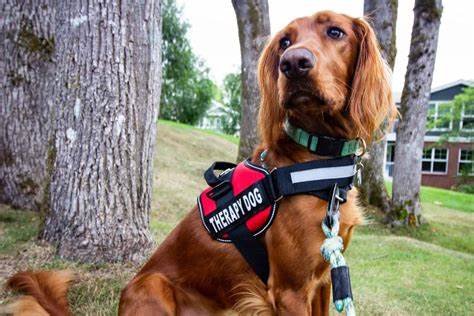Therapy Dogs in Mental Health Treatment
Therapy dogs are increasingly recognized as powerful allies in mental health treatment. Their unique ability to provide comfort, reduce stress, and offer unconditional affection makes them invaluable in helping individuals cope with a range of mental health challenges. Whether they are assisting patients with anxiety, depression, PTSD, or other mental health conditions, therapy dogs play a significant role in improving emotional well-being and enhancing therapeutic outcomes.
1. Providing Emotional Support
One of the primary roles of therapy dogs in mental health treatment is providing emotional support. Their presence can help individuals feel less isolated, offering a sense of comfort and security. For those struggling with anxiety, therapy dogs are especially beneficial. Studies have shown that petting or spending time with a dog can help lower blood pressure and heart rate, creating a calming effect. This calming presence is crucial for individuals experiencing panic attacks or severe anxiety, as it helps them ground themselves in the present moment. The bond formed with a therapy dog can lead to feelings of trust and safety, which are important in the therapeutic process.
2. Reducing Symptoms of PTSD
Therapy dogs have proven to be particularly effective for individuals suffering from Post-Traumatic Stress Disorder (PTSD). Veterans, survivors of trauma, and first responders with PTSD can experience heightened anxiety, flashbacks, and emotional numbing. In these cases, therapy dogs are trained to provide comfort during stressful moments and to help individuals regain a sense of control over their emotions. A therapy dog can provide a reassuring presence when someone is overwhelmed by traumatic memories, offering a distraction or providing physical contact to ground them during a flashback. Dogs also help reduce hypervigilance, a common symptom of PTSD, by helping individuals relax and become more present in their environment.
3. Facilitating Social Interaction
For individuals dealing with mental health challenges like depression, anxiety, or autism spectrum disorder, social interaction can be difficult. Therapy dogs help ease these social barriers by providing a non-judgmental and calming presence. In group therapy settings, dogs can encourage interaction among patients who might otherwise be reluctant to open up. Their presence can also serve as a social bridge, making it easier for individuals to engage in conversations and form connections with others. Dogs help create an environment of warmth and trust, allowing patients to feel more comfortable in group settings or even during one-on-one therapy sessions.
4. Supporting Cognitive and Behavioral Therapy
In addition to offering emotional support, therapy dogs can play a role in cognitive-behavioral therapy (CBT) and other therapeutic approaches. In CBT, therapists often work with patients to challenge negative thought patterns and behaviors. Therapy dogs can be incorporated into this process by providing positive reinforcement for desired behaviors and helping patients practice mindfulness techniques. For example, a patient may be encouraged to take care of the dog’s needs, which can help them practice responsibility and develop coping mechanisms. Dogs can also assist in helping patients focus during mindfulness exercises, as their natural ability to live in the moment supports the therapeutic goals of grounding and centering oneself.
5. Assisting in Crisis Situations
Therapy dogs are often used in crisis intervention programs, especially in environments like hospitals, schools, and disaster relief settings. When individuals experience trauma or sudden emotional distress, a therapy dog’s presence can help calm their emotions and provide immediate comfort. In schools, therapy dogs are used to help children deal with grief or traumatic events, offering emotional support during a difficult time. In hospitals, therapy dogs are used to reduce anxiety in patients before surgeries or treatments, making it easier for patients to cope with the stress of medical procedures. In disaster response scenarios, therapy dogs comfort survivors and help them process their emotions during the initial stages of recovery.

6. The Science Behind the Healing Power of Dogs
The positive effects of therapy dogs on mental health are not just anecdotal; there is substantial research supporting their impact. Studies show that interacting with dogs releases oxytocin, a hormone that promotes feelings of trust and bonding, and lowers cortisol levels, which are associated with stress. These physiological changes are particularly beneficial for individuals with mental health conditions, as they help regulate emotional responses and promote feelings of relaxation and safety. The physical act of petting a dog or simply being in their presence can trigger the release of endorphins, providing a natural mood boost. This scientific backing underscores the significance of therapy dogs in the mental health field.
7. Therapy Dogs in Specialized Programs
Therapy dogs are also involved in specialized programs aimed at supporting individuals with specific mental health needs. For instance, therapy dogs are increasingly being used in schools to assist children with autism, helping them with social skills and emotional regulation. In workplace settings, therapy dogs are used to help employees cope with job-related stress and improve overall well-being. In prisons, therapy dogs assist incarcerated individuals by offering emotional support and teaching responsibility. These programs highlight the versatility of therapy dogs and their ability to cater to a wide variety of mental health needs, from children to adults, and in diverse environments.
Conclusion
The role of therapy dogs in mental health treatment is becoming more widely recognized for its effectiveness in improving emotional well-being and promoting healing. Whether it’s reducing anxiety, providing emotional support, facilitating social interaction, or assisting in specialized therapies, therapy dogs offer numerous benefits to those dealing with mental health challenges. As therapy dogs continue to be integrated into mental health care, their positive impact will only grow, helping individuals build resilience, cope with stress, and navigate the challenges of life with greater ease.








